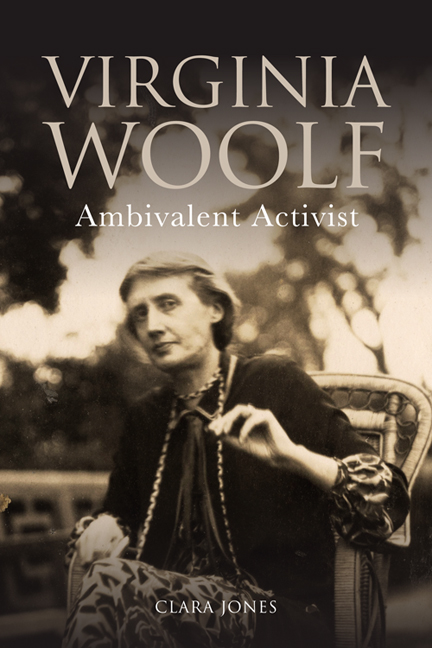Book contents
- Frontmatter
- Contents
- Acknowledgements
- Abbreviations
- Introduction
- 1 Virginia Stephen and Morley College, 1905–7
- 2 Virginia Stephen and the People's Suffrage Federation, 1910
- 3 Virginia Woolf and the Women's Co-operative Guild, 1913–31
- 4 Virginia Woolf and the Rodmell Women's Institute, 1940–1
- Conclusion
- Appendix 1 The ‘Morley Sketch’
- Appendix 2 The ‘Cook Sketch’
- Bibliography
- Index
1 - Virginia Stephen and Morley College, 1905–7
Published online by Cambridge University Press: 05 September 2016
- Frontmatter
- Contents
- Acknowledgements
- Abbreviations
- Introduction
- 1 Virginia Stephen and Morley College, 1905–7
- 2 Virginia Stephen and the People's Suffrage Federation, 1910
- 3 Virginia Woolf and the Women's Co-operative Guild, 1913–31
- 4 Virginia Woolf and the Rodmell Women's Institute, 1940–1
- Conclusion
- Appendix 1 The ‘Morley Sketch’
- Appendix 2 The ‘Cook Sketch’
- Bibliography
- Index
Summary
Introduction
The original [Mary] Sheepshanks wants me to go and see her, and talk over my views, which I aint none. She thinks I might combine amusement and instruction – a little gossip and sympathy, and then ‘talks’ about books and pictures. I'm sure I dont mind how much I talk, and I really dont see any limit to the things I might talk about. However as she is sure – the good Sheepshanks – that I shall be of the greatest use – I dont mind trying. (L1 172)
Virginia Stephen began corresponding with Mary Sheepshanks, the vice-principal of Morley College, in late December 1904 and took up a voluntary teaching post at the beginning of 1905. Over the course of her three years teaching once a week at Morley, Virginia Stephen taught history of art, history, English composition and poetry appreciation. When she first mentions voluntary teaching at Morley College to her then closest friend, Violet Dickinson, it is with a characteristic mixture of taciturnity and enthusiasm.
This January 1905 letter reveals the contradictory impulses that typified Virginia Stephen's attitude towards her work at Morley. Immediately striking is her reluctance to admit that she has any ‘views’ to ‘talk over’ with the college's vice-principal. The self-deprecating, mock-cockney aside, ‘which I aint none’, comically links Virginia Stephen to her future working-class students at Morley, however, it also registers some anxiety about her unfamiliarity with Mary Sheepshanks's world of voluntarism, public spirit and social enquiry. This is compounded by the confused way in which she relates what her role will entail. While her reference to ‘a little gossip and sympathy’ apparently reveals a dismissive attitude towards the demands of teaching, this lackadaisical tone is undermined by the uneasiness registered in the inverted commas enclosing ‘talks’. In the final line she appears to be sending up Mary Sheepshanks through her parodic, Dickensian figuring of her as ‘the good Sheepshanks’. This flippant aside encodes a key anxiety for Virginia Stephen throughout her work at Morley – her association of her voluntary teaching with what she perceived as the patronising, philanthropic activities of Victorian ladies, including her mother and half-sister, Stella Duckworth.
- Type
- Chapter
- Information
- Virginia WoolfAmbivalent Activist, pp. 17 - 64Publisher: Edinburgh University PressPrint publication year: 2015



